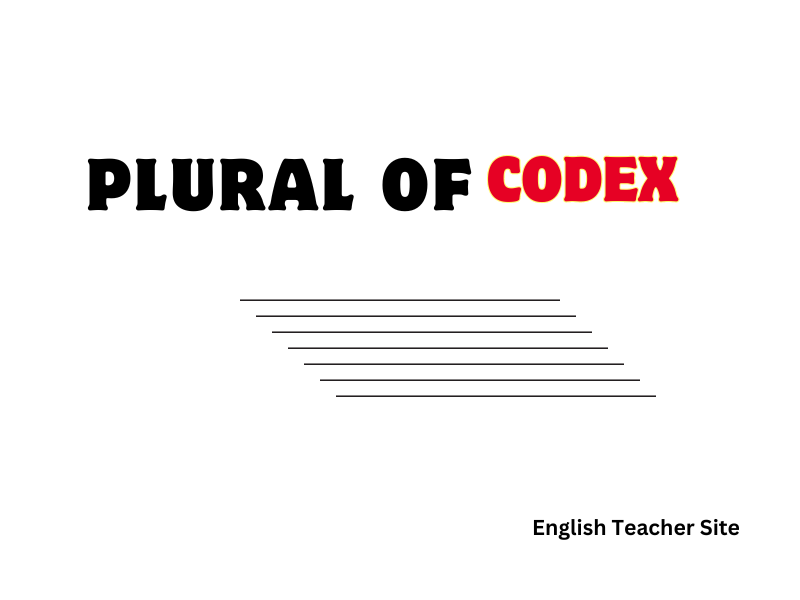Whats the Plural of Codex: Understanding Multiple Codices

- “Codex” refers to an ancient manuscript book written on materials such as parchment.
- The plural of “codex” can be correctly written as “codices” or “codexes,” reflecting its Latin origins.
- Understanding the singular and plural forms of “codex” sheds light on the transition of language from Latin to English.
The transformation from the singular “codex” to its plural form can sometimes be a subject of curiosity or confusion. Latin nouns ending in “-ex” typically change to “-ices” in their plural form, following a specific declension pattern. Therefore, the correct plural of “codex” can be either “codices” or “codexes,” with both terms being widely accepted within English usage.
What’s the Plural of Codex?
Singular to Plural:
The transformation from singular to plural in English sometimes follows the original language’s rules, which is the case with Latin-derived nouns.
Standard Plural Forms:
The word “codex” follows a traditional Latin pattern of noun inflection.
| Singular | Plural |
|---|---|
| Codex | Codices |
Alternate Plural Forms:
However, English adaptations have provided an alternative pluralization that follows regular English noun modification rules.
| Singular | Plural |
|---|---|
| Codex | Codexes |
In practice, both “codices” and “codexes” are accepted as the plural form of “codex,” although “codices” is often preferred in more formal or academic contexts.
Usage Examples:
- The library’s collection includes several ancient codices.
- Medieval scholars produced codexes with meticulous care.
Codex: Singular or Plural?
The term “codex” is singular, referring to a historical book made of many sheets of paper or parchment, bound together along one edge within a cover, usually denoting ancient manuscripts or books.
Singular Form
- Codex
- A single, bound manuscript.
- Used historically for texts like Scripture or ancient annals.
Plural Form
There are two acceptable plural forms, which stem from the word’s Latin origin:
Codices
- The preferred Latin pluralization.
- Follows the rule of changing the -ex ending to -ices.
Codexes
- An Anglicized version, more commonly used in casual settings.
- Adds -es following the standard English pattern for words ending in “x.”
| Singular | Plural (Latin) | Plural (Anglicized) |
|---|---|---|
| Codex | Codices | Codexes |
Usage in Sentences
- The library holds an impressive codex from the medieval period.
- Scholars analyzed several codices for their research.
- Different codexes can offer varying insights into historical events.
| Context | Preferable Plural Form |
|---|---|
| Academic Writing | Codices |
| General Use | Codexes |
Other Latin Nouns
| Singular | Plural | English Meaning |
|---|---|---|
| Alumnus | Alumni | Graduate |
| Alumna | Alumnae | Female Graduate |
| Radius | Radii | Ray, Spoke |
| Vortex | Vortices | Whirlpool |
These nouns follow patterns based on their endings in the Latin language. For example:
- Nouns ending in -us typically change to -i for their plural form.
- For nouns ending in -a in the feminine singular, the plural typically ends in -ae.
- Meanwhile, nouns ending in -ex or -ix often take the ending -ices in the plural.
Consider the following examples:
- Singular: Index | Plural: Indices | Meaning: List, Signpost
- Singular: Appendix | Plural: Appendices | Meaning: Addition, Supplement
Here are some nouns with their plurals noted:
- Basis: Bases
- Curriculum: Curricula
- Thesis: Theses
These plural forms appear frequently in academic writing and high register English.
| Ending | Singular | Plural |
|---|---|---|
| -um | Datum | Data |
| -on | Phenomenon | Phenomena |
| -a | Formula | Formulae |
Examples of Codex in Context
Below are examples of how “codex” and its plural form “codices” can be used in sentences that reflect their contextual meaning:
| Singular Use | Plural Use |
|---|---|
| The archaeologist discovered an ancient codex buried with the relics. | The museum’s exhibit displays a variety of codices from medieval Europe. |
| A scholar dedicated her life to the translation of a Mayan codex. | Historians analyzed the codices to understand the legal systems of ancient civilizations. |
In addition to formal usage, here are sample contexts where both forms can arise:
- In Libraries:
A venerable institution houses a prized codex significant to the region’s cultural heritage.
- In Academia:
Researchers across the globe study codices to gain insights into a forgotten language.
- In Preservation:
Conservators employ meticulous techniques to maintain the integrity of a fragile codex.
Examples of Codices/Codices in Context
In exploring the use of the word “codex,” it’s integral to understand its most common form in the plural—codices. The term “codex” refers specifically to an ancient manuscript in book form. These manuscripts were the precursors to modern books, hand-written, and often used for recording significant works of religion, literature, or science.
Ancient Libraries: In historical archives or museums, one might find extensive collections of codices.
- Vatican Library: Home to remarkable biblical manuscripts.
- The British Library: Preserves classic codices of Greek and Latin literature.
| Location | Notable Codices |
|---|---|
| Vatican Library | Codex Vaticanus |
| The British Library | Codex Sinaiticus, Codex Alexandrinus |
Scholarly References:
Academic circles frequently discuss the content, form, and preservation of codices.
- Scholars often debate the historical accuracy or provenance of a particular codex.
- Research papers might compare different codices to trace textual variations.
| Research Focus | Relevance |
|---|---|
| Provenance of Codices | Determines historical context. |
| Textual Variations | Highlights differences in manuscript copies. |
Origin of the Word Codex
The term codex, which refers to a manuscript book, is steeped in historical origins that trace back to Latin roots. The evolution of the word reflects both the advancement of bookmaking technology and changes in linguistic practice.
Etymology and Development
- The Latin word caudex, meaning “trunk of a tree” or “block of wood,” is the antecedent of codex.
- Originally, caudex was used to describe wooden tablets used for writing, which were bound together to form early types of books.
- The transition from caudex to codex signified the move from wooden tablets to more sophisticated and enduring forms of volumes, especially for texts of importance.
| Latin Origin | Contemporary Meaning |
|---|---|
| caudex | Trunk of a tree |
| codex | Manuscript book |
The historical significance of the codex is substantial as it marks the shift from scrolls to a predecessor of the modern book. This leap in format facilitated easier reading and navigation of texts, which has had a lasting impact on how books are consumed.
Adoption and Usage
- During the 3rd and 4th centuries A.D., the codex format gained popularity over scrolls for its compact and user-friendly design.
- Notably, early Christians adopted the codex for their scriptures, which promoted its widespread use within the culture of the time.
| Historical Milestone | Impact |
|---|---|
| Adoption by early Christians | Increased codex popularity |
| Replacement of the scroll format | Enhanced accessibility of texts |
In contemporary English, the word codex retains a sense of historical and academic significance often associated with ancient or classical manuscripts. The plural form can be codices, adhering to the original Latin, or the anglicized codexes. Both pluralizations are correct and used interchangeably, adding to the rich linguistic tapestry of English.
Codices have been pivotal in the preservation of historical documents, knowledge, and culture, thereby emphasizing the profound legacy of their origin.
Sources
- Harper Douglas, “Etymology of codex,” Online Etymology Dictionary.
- Britannica, The Editors of Encyclopaedia. “Codex Sinaiticus”.
- etymonline “codex“
My name is Khamis Maiouf. I am the creator of the English Teacher Site, dedicated to providing valuable resources and insights for students around the world. With a passion for education and a commitment to helping students enhance their skills, I aim to make English teaching more effective and enjoyable for both educators and students.






